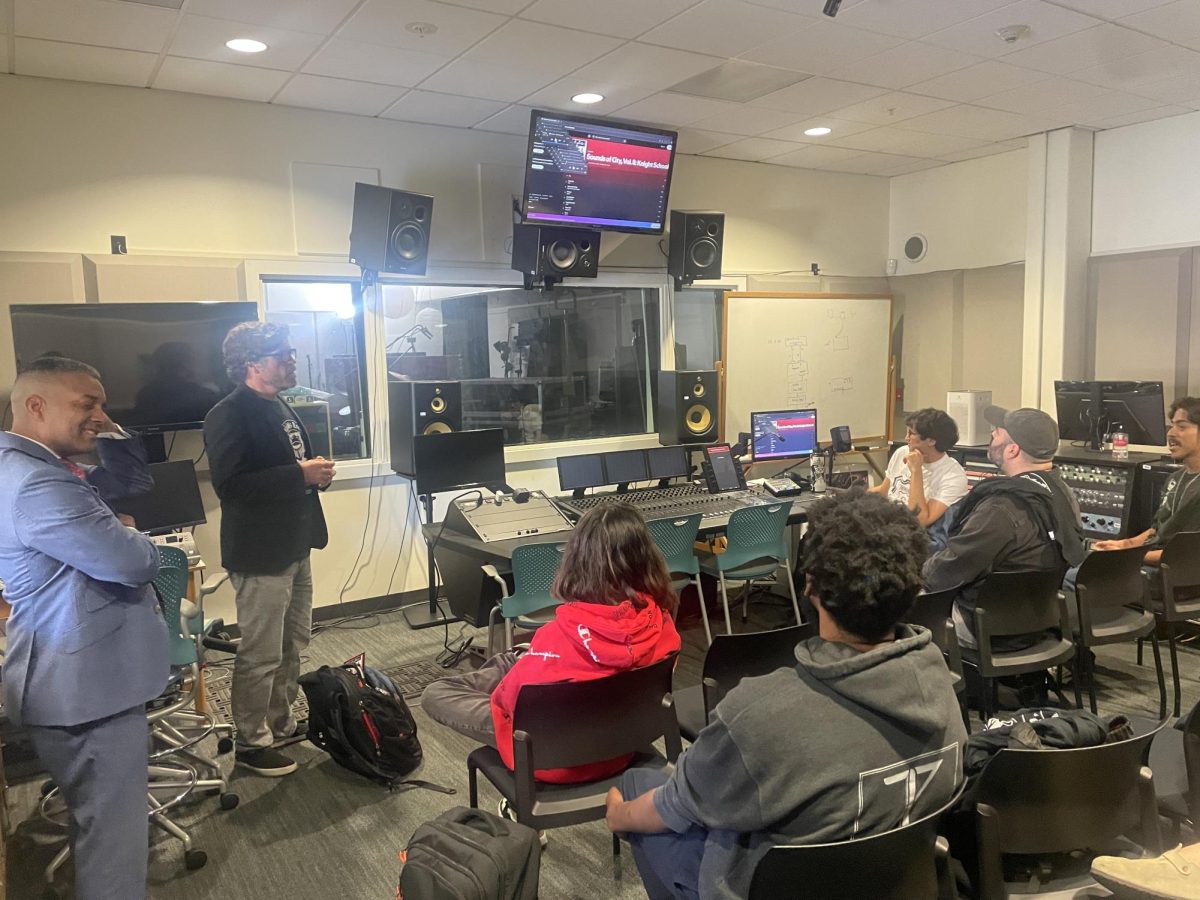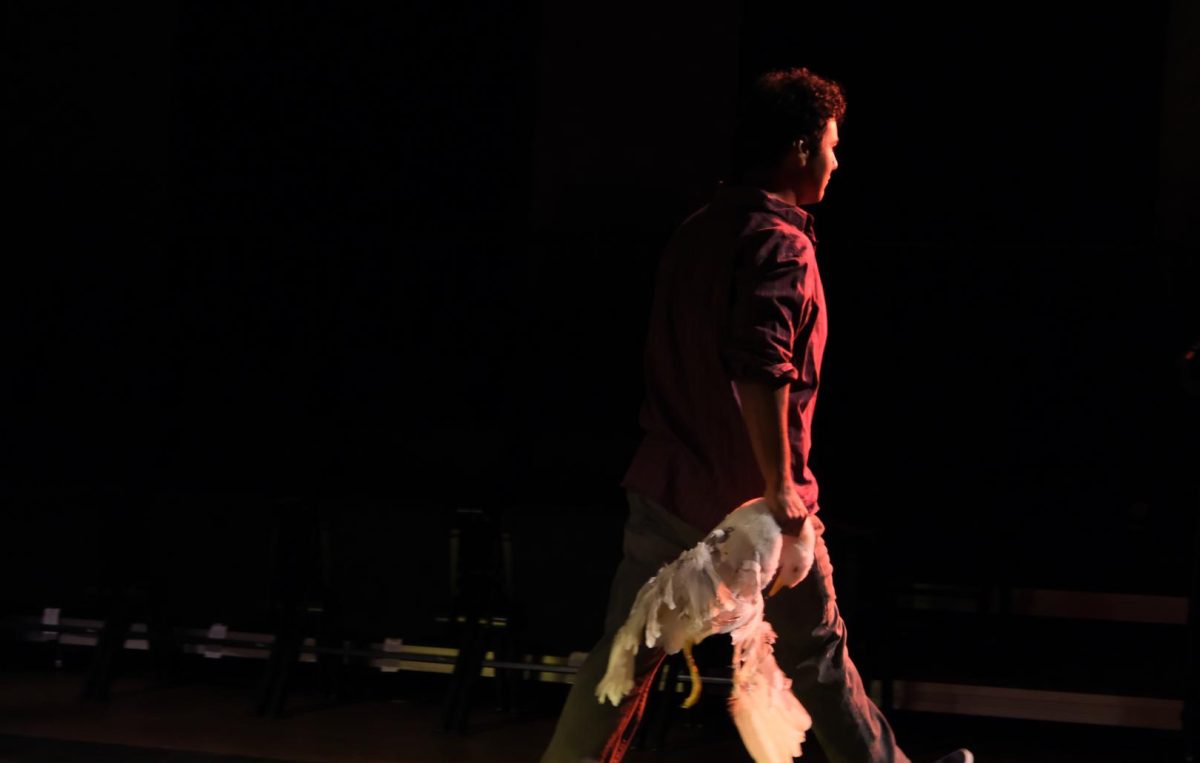HEATHER RICHARDS
City Times
Two of the actors are stopped, yet again, by June Richards’ sharp voice.
“No, no, no. I will scream from the audience. It’s an ugly gesture – what I said nine thousand times.”
Fifteen other students gathered on the edges of the stage ham it up to one another as Richards holds court from a metal folding chair upstage. This is a rehearsal for “42nd Street,” and June Richards is the director.
“Good. Perfect,” Richards says to the tortured-looking man whose gesture was so unattractive, but stops him again, “No, don’t be cute.”
A small woman with a warm, intense presence, Richards has been the artistic director at San Diego City College for, “10 exquisite, beautiful years.”
“42nd Street” is the latest production, and with three weeks to go, the actors are still missing cues and bumping into one another. Richards remains calm and commanding. Rising to act out a bit of a song, castigating, threatening and encouraging the actors she admits are mostly green, Richards still appears confident that the show will succeed. She has been in her students’ shoes many, many times.
“When there is a movement the people involved don’t know that they are setting precedents. This is when no one had moved to New York yet,” Richards recalls of her early days in the business right before New York’s theater scene had a significant revival. Her memories are dotted with powerful names: Jose Ferrer, Amy Irving, Morton Subotnick.
She began acting as a teenager through her high school though her family had no involvement in theater. “Not at all, nothing.” Richards says she fell “madly in love with performing,” and so joined the Oregon Shakespeare Festival where she met the daughter of Uta Hagen; Hagen was already a significant name in theater. “Much of life is accidental,” Richards says.
At that time, what is now the Lincoln Center Repertory Theatre was the San Francisco Actors Workshop. Richards performed numerous plays with the workshop and eventually moved with the company to New York City. The Lincoln Center Repertory Theatre was intended to be the cornerstone of theater in the U.S., and Richards was involved in the beginning of that movement. She then joined the Herbert Bergdorf Studio in lower Manhattan under the tutelage of one of New York’s prestigious and most respected acting teachers, Uta Hagen.
She was “very intense, very smart,” Richards says of Hagen. Hagen’s theory is sometimes compared, sometimes contrasted, to Stella Adler who was teaching just across town at what is now the New School University.
Robert De Niro, Al Pacino and Marlon Brando are other students associated with these two acting teachers.
Richards’ years in New York, about four in all, saw many shows and many friends and acquaintances who would later become famous. But when looking back on her life, she said the raising of her two daughters as a single mother, and putting them both through college, is her most significant accomplishment.
“The reality of supporting them made it clear that being an itinerant actor, which is what you are, was impossible,” she says.
Faced with leaving the profession of acting, Richards said she realized she would have to go back to school. In three and a half years, she obtained her associate’s, bachelor’s and master’s degrees, and became the artistic director at Contra Costa College in the Bay Area. “Almost from day one, my strength is in developing programs,” she notes.
Much of what she did in the ethnically diverse atmosphere at Contra College is visible in her work at City College, where she created a new curriculum and expanded a somewhat beleaguered program.
Richards says San Diego is unique as a border culture and thus has its own “signatures and identity.” When she directed “The Whiz,” she collaborated to make the lead bi-lingual, translating some of his lines into Spanish.
Because of the diversity of City College’s students, Richards says she is constantly looking for ways to incorporate ethnic diversity.
Students refer to her as blunt, a fact that surprised Richards. “I try hard to create a situation in which there isn’t anything other than encouragement.” However, “that is who I am, as an individual.”
“Passion can be intimidating,” said Alicia Rincon, department chair for visual and performing arts, who co-directs “42nd Street” with Richards. “June is completely committed to her art . (and) has a unique balance between great passion and intense clarity of communication, so she can pin point issues and communicate to the students who may misunderstand the situation at hand. She is always compassionate.”
Richards grasps the hands of the lead singer, kissing each of them, her voice too low for the rest of the company to hear. After three hours of tedious repetitions the rehearsal is over. Richards singles out the actors to affirm their work. The man with the bad gestures smiles nervously as she commends his efforts.
“The hardest thing for students,” Richards said, “is rejection . you hav”







